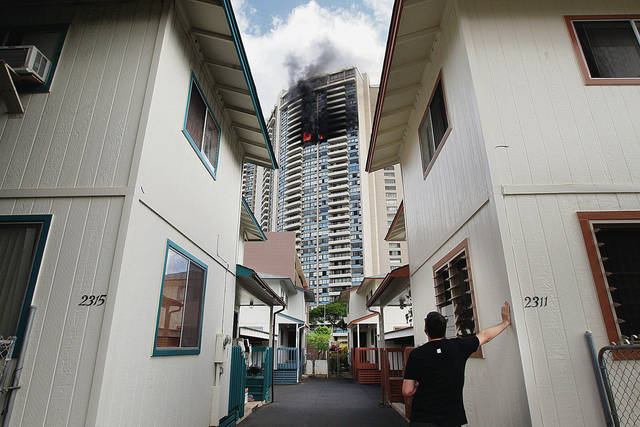$4,305.
That was the estimated per-unit cost to install a fire sprinkler system in the Marco Polo Apartments tower in 2005. But the extra expense, for many condo owners in the building, wasn’t deemed worthy or affordable — and that’s a scenario confronting residents in a few hundred Honolulu residential high-rises that lack automatic fire suppression systems.
The Marco Polo was built four years before Honolulu officials required such systems in new residential high-rises.
The 36-story tower at 2333 Kapiolani Blvd., containing 568 residential units and four commercial spaces, was built by Washington-based development and construction firm Reed & Martin Investment Corp. in 1971. The 4-acre site where Richard Smart, onetime owner of Parker Ranch, built a home later became headquarters of the American Chinese Club of Hawaii.
Reed & Martin, which moved to Hawaii from Alaska in 1963 to focus on construction projects that included military housing, roads, office buildings and condos, bought the property for $1.7 million and developed the Marco Polo for $25 million.
When the S-shaped building was built, it was described as elegant and featured amenities including tennis courts, a golf driving range, putting green, paddle tennis court, volleyball court and barbecue area atop a seven-story parking garage. A restaurant and cocktail lounge, barbershop, beauty salon, liquor store and delicatessen were on the ground floor of the 350-foot tower below residences.
Original prices in the leasehold building were as low as $18,500 for studios. Lease rent, which was paid to Reed & Martin, was fixed for the first 40 years and ran a total of 70 years, or until 2041.
Over time, some owners purchased the fee interest that is now held by the Harry & Jeanette Weinberg Foundation. Marco Polo units on the market today range from $339,000 for a 831-square-foot leasehold condo to $650,000 for a 1,030-square-foot fee-simple unit.
In 1971, when sales began, the Marco Polo was described as the largest residential condo in Hawaii. It was also the first tower built under Honolulu’s Comprehensive Zoning Code, but fire sprinklers weren’t mandated in such buildings until 1975.
Persuading owners of condo buildings in Honolulu built before 1975 to install fire sprinklers has been a tough sell. In 2005 the City Council had a task force created to estimate retrofit costs and recommend incentives for doing the work.
A report from the task force estimated sprinkler system costs at four of roughly 300 residential buildings in Honolulu that don’t have sprinkler systems. The Marco Polo was the least expensive at $4,305 per unit. Costs per unit were higher for smaller buildings: $8,550 at Pearl One in Aiea, $10,459 at 1001 Wilder Ave. and $13,473 at The Royal Court on Ward Avenue.
Incentives suggested by the task force included a property tax credit, low-income loans sponsored by the city and a break on mandatory maintenance expenses for pipe systems that firefighters use to pump water up to high floors.
The 2005 report followed a similar effort five years earlier and was prompted by high-rise fires that included one that killed a man in Waikiki. In 2000 a fire in the Interstate Building office building at 1333 S. King St. led to requirements for owners of older commercial buildings to install sprinklers.

